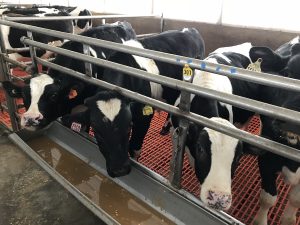 Did you know milk-fed veal calves are raised significantly different today? The American Veal Association (AVA) made a goal in 2007 to move completely to group housing over a ten-year period. Since then, AVA members have researched the best facilities to provide optimal care and the financial resources to make it happen by the end of 2017.
Did you know milk-fed veal calves are raised significantly different today? The American Veal Association (AVA) made a goal in 2007 to move completely to group housing over a ten-year period. Since then, AVA members have researched the best facilities to provide optimal care and the financial resources to make it happen by the end of 2017.
I had the opportunity to visit Strauss Veal Feeds and Midwest Veal just last week to see it all for myself. Dr. Marissa Hake, Midwest Veal staff veterinarian, took us through the life of a veal calf and shared all the details of group housing and how good health and well-being are maintained.
“The typical veal animal comes off the farm as a dairy bull calf. It’s about 85-100 pounds and they move into individual pens just like a heifer or dairy beef raiser. They are in those individual pens for about six weeks, which we consider a nursery. We make sure they are healthy and their immune systems are up before we move them into group housing,” Dr. Hake said.
 “Going to group housing has definitely been a good move. They can stand up, lay down, turnaround, groom naturally and interact with their friends,” Dr. Hake said.
“Going to group housing has definitely been a good move. They can stand up, lay down, turnaround, groom naturally and interact with their friends,” Dr. Hake said.
The pens we saw at a Midwest Veal farm in Northern Indiana housed five calves each. Dr. Hake said it’s just like school. Calves have different personalities. More dominant calves are grouped together giving those shy calves more time at the bunk.
Calves are fed a nutritionally balance milk-formula along with grain and roughage for up to 22 weeks of age and are marketed at 500 pounds. Dr. Hake also stressed that castration, dehorning, tail docking or tethers are not practiced on AVA member farms.
Dr. Hake said they work closely with the dairy industry because they are using a by-product of the industry. The calves on Midwest Veal farms are tagged by the dairy farm. This ensures a secure form of traceability. Total protein sampling and health assessment are also taken and given back to the dairy farm for their records.
I have grown up and still work in the cattle community but on the beef side. I will be very honest, I learned a lot and I know you will too. Listen to my complete chat with Marissa to learn more about the U.S. veal industry and tune in to This Week in Agribusiness for the complete story. Interview with Dr. Marissa Hake, Midwest Veal

